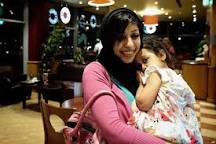Despite promises, Zainab al-Khawaja and son remain in detention

On 7 April 2016, Foreign Minister of Bahrain Sheikh Khaled bin Ahmed al-Khalifa said officials would release prominent human rights activist Zainab al-Khawaja and her son from prison. “This is a humanitarian issue, and Zainab al-Khawaja will be released pending her case in court,” said Sheikh Khaled in a press release last month. Since the Foreign Minister’s statement, the Government of Bahrain has yet to release news of any efforts to free Zainab or her son.
Bahraini security forces arrested Zainab in March 2016 after she exhausted her appeals process on charges that violate her internationally sanctioned right to free expression. Since her arrest, Zainab and her one-year-old son have remained at Isa Town Detention Center. Police at the detention center have subjected Zainab to unsanitary prison conditions, risking the health of her and her infant.
Since Zainab’s arrest, 40 NGOs have called for her unconditional release, noting that her case is one in an ongoing trend of repression of free expression. Bahraini courts also sentenced Zainab’s sister to one year in prison on free expression charges, and her father is currently serving a life sentence in Jau Prison for his participation in the 2011 pro-democracy uprisings. The United States government has yet to issue a public statement calling for Zainab’s release.
Sheikh Khaled promised to release Zainab during remarks with Secretary of State John Kerry on his first visit to Bahrain in April 2016. Many of Secretary Kerry’s comments centered on Iran and combating terrorism. Of all remarks released during Secretary Kerry’s visit to Bahrain, Americans for Democracy & Human Rights in Bahrain (ADHRB) found that the mention of human rights comprised less than one percent of his public statements. One month after Secretary Kerry’s visit, the State Department spokesperson said he “can only imagine that [the US] has been in touch with [Bahrain] through the embassy” regarding Zainab’s case. He gave no further details.
Despite the promise of her release, the Government of Bahrain continues to imprison Zainab and her son. Previous cases show that international public pressure is a successful tactic in ensuring the release of human rights defenders. US leaders must publicly press Bahraini officials to uphold their promise of Zainab’s release. Public pressure calling on Bahrain to release political prisoners of conscience sets a precedent for a key US ally to uphold democratic ideals and allow for free expression in civil society.
